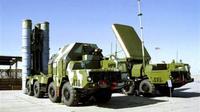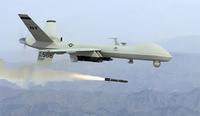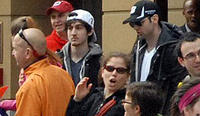-
Smartphone technology to accelerate development of unattended sensors
DARPA wants to develop low-cost, rapidly updatable intelligence, surveillance, and reconnaissance (ISR) sensors – to be used by the military on the ground, in the air, at sea, and undersea – in less than a year, a marked improvement to the current three-to-eight year development process. It hopes to do so by using an original design manufacturer (ODM) process similar to that of the commercial smartphone industry.
-
-
Chinese government hackers steal designs of advanced U.S. weapons systems
The Chinese government has been conducting a broad, sustained, and disciplined campaign of cyberattacks against U.S. government agencies, critical infrastructure, private companies, and news organizations. The public version of a study prepared for the Pentagon by the Defense Science Board now says that Chinese government hackers have also been able to penetrate the computer networks of all the major U.S. defense contractors, stealing the designs and specifications of the most advanced weapon system in the U.S. arsenal, and gaining insights into broad technologies on which U.S. military advances are based.
-
-
San Diego to receive $16.9 million in DHS funding
Some cities see DHS cutting its funding for their terrorism-related programs, but other cities see such funding increasing. A case in point is San Diego, which will receive $16.9 million in DHS funding to strengthen the city’s security against terrorist attacks.
-
-
Game changer: Russia to supply Syria with advanced S-300 air-defense systems

In what should be regarded as a major victory for Iran and its two regional allies, Syria and Hezbollah, Russia has announced it would provide Syria with advanced S-300 air defense missiles. The United States, Israel, and EU and NATO countries have been vigorously, and anxiously, pressing Russia not to go ahead with the sale of the missiles, because the deployment of the S-300 would make the imposition of a no-fly zone over Syria, let alone air attacks on targets inside Syria — like the ones Israel conducted in late January and early May — much costlier.
-
-
McCain meets with Syrian rebel leaders in Syria
Senator John McCain (R-Arizona) on Monday, Memorial Day, met with Syrian rebel leaders. McCain’s visit makes him the highest ranking U.S. official to enter Syria since the civil war began in 2011.Rebel commanders asked that the U.S. consider providing heavy arms to the Free Syrian Army, set up a no-fly zone in Syria, and conduct airstrikes on Hezbollah. McCain, for his part, asked the rebels how they planned to reduce the presence of Islamic extremists in rebel ranks.
-
-
Biometric technology identifies one of the Boston Marathon bombers
In a study which evaluated some of the latest in automatic facial recognition technology, researchers were able quickly to identify one of the Boston Marathon bombing suspects from law enforcement video, an experiment that demonstrated the value of such technology.
-
-
Firefighters, FAA weighing the use of drones for wildfires
With the wildfire season already claiming land and homes in the Western United States, federal government firefighters are considering the use of drones outfitted with cameras to map out the size and speed of a wildfire.
-
-
New Obama policy sets higher standards for drone use

In a major policy speech Thursday, President Obama announced plans to set higher standards for the use of drones in the fight against terrorists. He defended the use of the unmanned vehicles in that war, however, including when, in extreme situations, they are used to kill American citizens.
-
-
DHS: it is impossible to stop 3D plastic guns from getting past security checkpoints

A DHS intelligence bulletin starkly warns it may not be possible to stop 3D-printed guns from being made – or from getting past security checkpoints undetected. DHS notes that 3D-printed firearms can be made without serial numbers or unique identifiers, making ballistics testing difficult, and that advancements in technology and decreasing 3D printer costs will mean even more sophisticated printed guns will become easier to acquire.
-
-
New technologies help in tornado prediction

Scientists are working to increase tornado warning times. A new method, known as “warn-on forecasts,” will issue warnings based on forecasts rather than on observations. These warnings could increase the warning time to one -to-six hours before a tornado touches down. Another methodology being developed would give meteorologists the ability to tell people how strong the tornado will be before it hits the ground.
-
-
Syrian army attacks Israeli army patrol; Israel retaliates, issues stark warning
Syrian forces have fired at an Israeli army patrol Tuesday, and for the first time since the beginning of the conflict in Syria, the Syrian government publicly took responsibility for the firing. In response, Israel launched a cruise missile and destroyed the Syrian position from which the Syrian soldiers fired into Israel. Israel’s military chief warned: “We will not allow the Golan Heights to become a comfortable space for Assad to operate from.”
-
-
GPS technology offers 3-minute tsunami alerts
Researchers show that by using global positioning systems (GPS) to measure ground deformation caused by a large underwater earthquake, they can provide accurate warning of the resulting tsunami in just a few minutes after the earthquake onset.
-
-
FBI defends handling of Boston bombing, admits FBI-CBP miscommunication
FBI director Robert Mueller yesterday defended the way his agency handled the Russian request that the FBI pay attention to Tamerlan Tsarnaev in the months before the 15 April attack on the Boston Marathon. The two key junctures: following the FBI’s March 2011 investigation of Tamerlan, an investigation which found no ties between him and terrorism, the FBI twice, in September and October 2011, asked the Russian security services for more information about why the Russians suspected Tameraln, so the FBI could dig more deeply, but the Russians never responded. Still, the FBI went ahead and placed Tameraln’s name on a low-level watch list, which meant that his travel was tracked. The CBP Boston office, however, took no action in response to two FBI’s electronic messages – from January and June 2012 — about Tsarnaev’s travel to Russia.
-
-
Israel warns Assad: if you attack Israel, you “risk forfeiting [your] regime”
Israel has issued a highly unusual public warning to Syrian president Bashar al-Assad. The warning, couched in no uncertain terms, consists of two parts: First, if Syria and Iran again try to ship game-changing weapon system to Hezbollah, Israel will destroy these shipments, as it has already done three times, on 30 January, 3 May, and 5 May. Second, if Syria retaliated against Israel in the wake of such attacks, Israel would inflict crippling blows on the Assad regime and force Assad from power.
-
-
DHS refuses FOIA requests for the Tsarnaev brothers’ immigration papers

DHS has rejected repeated FOIA requests for the federal immigration records of the Boston Marathon bombing suspects, as well as Immigration and Customs Enforcement’s records on Tamerlan Tsarnaev, saying they are still conducting an investigation.
-
More headlines
The long view
Why Ukraine’s AI Drones Aren’t a Breakthrough Yet
Machine vision, a form of AI, allows drones to identify and strike targets autonomously. The drones can’t be jammed, and they don’t need continuous monitoring by operators. Despite early hopes, the technology has not yet become a game-changing feature of Ukraine’s battlefield drones. But its time will come.
